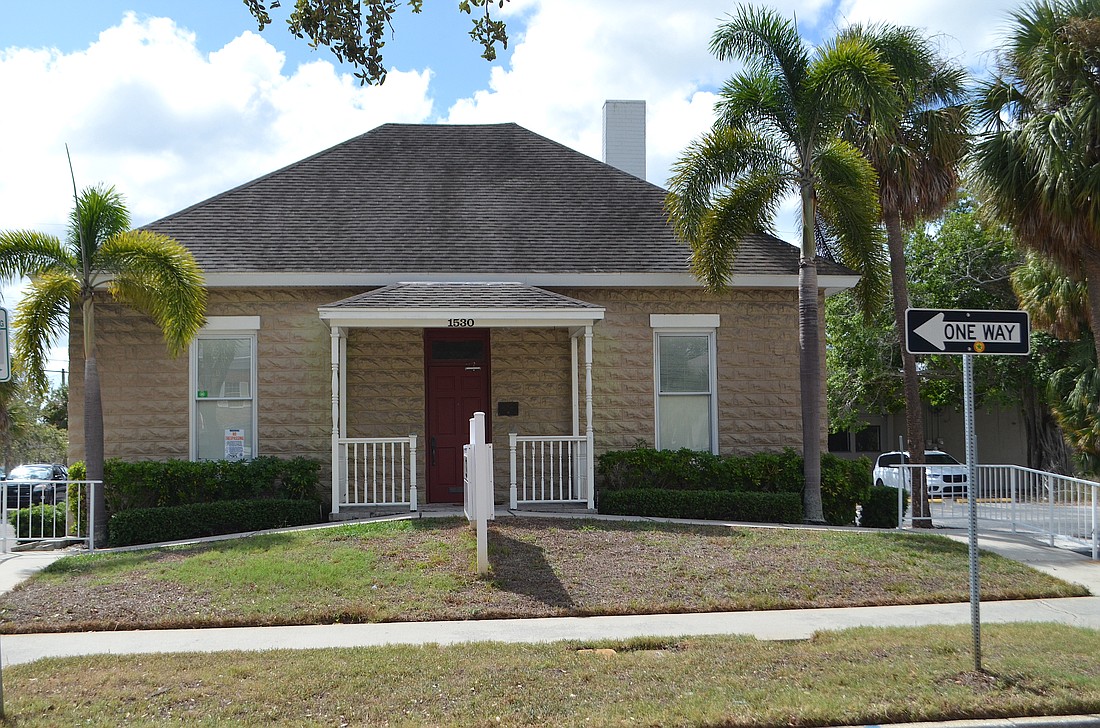- May 14, 2025
-
-
Loading

Loading

The Sarasota City Commission has voted to allow a developer to make plans to potentially demolish the historic McAlpin House on Cross Street to make way for a mixed-use development on 3.1 acres of property in downtown Sarasota.
But options other than a bulldozer, including physically moving the house to Pioneer Park to preserve it, are still being discussed.
At the May 6 commission meeting, commissioners voted 3-2 to approve the demolition permit for the vacant 1,200-square-foot McAlpin House located near Burns Court. Commissioner Debbie Trice and Vice Mayor Jen Ahearn-Koch cast the dissenting votes.
With its $32 million acquisition by developer Orange Pineapple LLC, the property includes the small rusticated block house at 1530 Cross St., built in 1912 and occupied by George McAlpin, regarded as one of the city’s founding fathers.
In the 1980s, the house was designated as a historic structure. Earlier this year, the city's Historic Preservation Board voted to deny Orange Pineapple’s request to demolish the house.
The May 6 commission vote overturned the board’s decision.
The attorney for Orange Pineapple, Patrick Seidensticker, told commissioners developers had several ideas on how the new building could preserve or honor the historical significance of the McAlpin House.
City planners have determined the park could accommodate the house. Who would pay to maintain the house remains uncertain.
Seidensticker told commissioners the Sarasota Historical Society may be interested in maintaining the house after it was moved, but it would require money to do it.
“You have to have someone to receive it,” said the city’s senior planner, Clifford Smith. “They would need some sort of endowment.”
If the house cannot be relocated and is demolished, Orange Pineapple has offered to donate $200,000 to the city for historic preservation efforts elsewhere.
The entire development property is zoned Downtown Core, which permits construction of up to 10 stories high and a residential density of 50 units per acre. Orange Pineapple is planning a mixed-use redevelopment there in the triangular area bound by South Pineapple Avenue, South Orange Avenue and Ringling Boulevard. Cross Street bisects the site near the northern end.
Commissioner Erik Arroyo suggested the structure is not architecturally unique, has been vacant for some time and creates a void in an area ripe for redevelopment.
“I think we need to be a little more discerning about what we deem historic,” he said.
With the city’s approval, Orange Pineapple can now move forward with a site plan, which could take up to two years to complete, Seidensticker said. The demolition permit is also valid for two years.
Seidensticker said the developer pledges not to demolish the house before the site plan is approved by commissioners. In that period of time, Seidensticker said Orange Pineapple would continue to work with the city and the Historical Society to try to work out a deal to move the house to the park.
In other action, the city commission directed the city manager to assist a local nonprofit to compile data to be included in a Municipal Equality Index published by the Human Rights Campaign.
Ken Shelin, a former city commissioner and longtime resident, made the request on behalf of Project Pride SRQ, which has offered to do most of the research needed for Sarasota to be included in the Index.
The Human Rights Campaign is a national organization dedicated to ensuring LGBT people are treated as full and equal citizens around the world, according to its website.
The Municipal Equality Index examines how inclusive municipalities are of LGBT people who live and work there. Cities are rated on nondiscrimination laws, the municipality as an employer, municipal services, law enforcement, and leadership on LGBT equality. The index includes data from more than 600 cities in the U.S., including Tampa and St. Petersburg.
The index contains strictly numerical data and offers no commentary, Shelin told commissioners.
Shelin said people thinking of moving to Sarasota ask basic questions.
“What kind of a city is it? Is it open, is it accepting, is it tolerant,” he said. “This document ... is a very quick and easy way to figure that out.”
Sarasota resident Jose Fernandez spoke against the city's participation. He described the HRC as trying to pressure local governments into “implementing and expanding socially liberal policies,” and “withdrawing support from conservative and religious organizations through implicit threats of low scores.”
“Why would we intentionally expose ourselves to, and facilitate, their manipulation?” he asked commissioners. “We simply don’t need this.“
Shelin countered by telling commissioners, ”You may be selling yourself short. … In my experience, I think the city will end up with a pretty good score. It’s in the city charter that discrimination is prohibited. It’s consistent with the city charter and internal policies as well.”
Shelin emphasized cooperating with Project Pride SRQ will not cost the city anything. “We’re volunteering to do this for you.”
Once the report is compiled, the group will submit it to the commission for approval. It will be the city’s decision to amend any data if they wish, and to submit the data to the Human Rights Campaign or not. “You may see some things you want to fix. It’s up to you.”